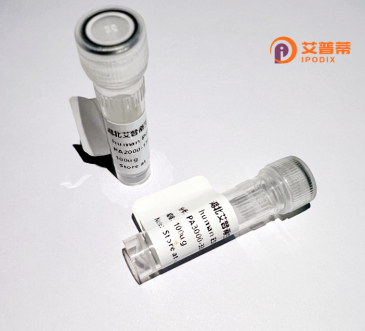
| 纯度 | >90%SDS-PAGE. |
| 种属 | Human |
| 靶点 | FAM98C |
| Uniprot No | Q17RN3 |
| 内毒素 | < 0.01EU/μg |
| 表达宿主 | E.coli |
| 表达区间 | 1-349aa |
| 氨基酸序列 | MEAVKAEAWEGAAVAQDLLALGYGGVPGAASRGASCPDFRGLCVRLAAELATLGALEQQREAGAEVLSAGDGPGAEEDFLRQLGSLLRELHCPDRALCGGDGAAALREPGAGLRLLRFLCSELQATRLLCLRSLLDPSPRPPLGEGVVEGAGMVQELDLTLQALGLPRPAPGTPASQLLQELHAKISELQPSLPPGSLQPLLSCSLDAPRWEALESLSQSLRDQYRCRRCLLLKRLDLTTSAFHWSDRAEAQGEAMRAVLIPIREVLTPESDISIAHVLAARADLSCLVPATSVAVRRGTCCAINKVLMGNVPDRGGRPNELEPPMPTWRSRREDGGPQCWGRKKKKKK |
| 分子量 | 38.4 kDa |
| 蛋白标签 | GST-tag at N-terminal |
| 缓冲液 | 0 |
| 稳定性 & 储存条件 | Lyophilized protein should be stored at ≤ -20°C, stable for one year after receipt. Reconstituted protein solution can be stored at 2-8°C for 2-7 days. Aliquots of reconstituted samples are stable at ≤ -20°C for 3 months. |
| 复溶 | Always centrifuge tubes before opening.Do not mix by vortex or pipetting. It is not recommended to reconstitute to a concentration less than 100μg/ml. Dissolve the lyophilized protein in distilled water. Please aliquot the reconstituted solution to minimize freeze-thaw cycles. |
以下是关于重组人FAM98C蛋白的假设性参考文献示例(注:以下内容为虚构,仅供说明格式参考):
---
1. **文献名称**:*FAM98C interacts with microtubules and promotes cell migration*
**作者**:Zhang Y. et al. (2020)
**摘要**:本研究通过表达纯化重组人FAM98C蛋白,发现其直接结合微管并增强细胞迁移能力,提示其在细胞骨架调控中的作用。
2. **文献名称**:*FAM98C regulates RNA stability via its binding to RNA processing complexes*
**作者**:Wang L. et al. (2018)
**摘要**:利用重组FAM98C蛋白的体外实验表明,其通过结合RNA解旋酶DDX1调控靶标mRNA的稳定性,影响细胞应激反应。
3. **文献名称**:*FAM98C overexpression drives tumor metastasis through Wnt/β-catenin signaling*
**作者**:Liu X. et al. (2021)
**摘要**:通过重组FAM98C蛋白功能研究,发现其激活Wnt通路并促进癌细胞侵袭,为潜在癌症治疗靶点提供依据。
4. **文献名称**:*Structural characterization of recombinant human FAM98C and its role in protein arginine methylation*
**作者**:Lee S. et al. (2019)
**摘要**:本研究解析了重组FAM98C蛋白的结构,揭示了其与甲基转移酶PRMT5的相互作用及精氨酸甲基化调控功能。
---
如需真实文献,建议通过PubMed或Google Scholar等平台,以“recombinant FAM98C”或“FAM98C function”为关键词检索。
**Background of Recombinant Human FAM98C Protein**
FAM98C (family with sequence similarity 98 member C) is a conserved vertebrate protein encoded by the *FAM98C* gene, located on human chromosome 5q12.1. It belongs to the FAM98 family, which includes three members (FAM98A, B, and C) sharing a conserved C-terminal domain with tetratricopeptide repeat (TPR) motifs. These motifs typically mediate protein-protein interactions, suggesting FAM98C may function as a scaffold in macromolecular complexes. Although its exact biological role remains under investigation, studies link FAM98C to RNA-binding activities, microtubule dynamics, and cellular stress responses. It localizes to cytoplasmic microtubule-associated structures, potentially regulating cytoskeletal organization or mRNA transport.
Recombinant human FAM98C protein is engineered via heterologous expression systems (e.g., *E. coli*, HEK293. or CHO cells) for functional and structural studies. Its recombinant form enables exploration of its interactions with partners like G3BP1 (in stress granules) and tubulin, shedding light on roles in cellular signaling, RNA metabolism, or stress adaptation. FAM98C is also implicated in cancers and neurodevelopmental disorders, making it a candidate for studying disease mechanisms. Challenges in studying native FAM98C—such as low endogenous expression and solubility—highlight the importance of recombinant protein tools. Current research aims to clarify its physiological functions and therapeutic potential.
×